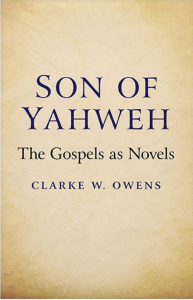As a follow up to my last post I am sharing here another valuable snippet I read in Clarke Owens’ Son of Yahweh: The Gospels as Novels.
Owens’ first chapter, “Literary Criticism and the Historical Jesus”, is brilliant and deserves to be read and addressed by everyone who has an interest in how scholars work on the “quest” for the historical Jesus. My reasons for that evaluation:
- the chapter gives the most articulate and cogent explanation I have yet read for why anyone would have “made up” the Jesus story;
- the chapter exposes the fundamental flaws in the methodology of HJ scholars;
- it exposes how the quasi-historical methods of HJ scholars serve theological ends (in part the topic of this post);
- it demonstrates the failure of HJ scholars to understand modern literary criticism and its relevance for historical enquiry;
- it demonstrates in the simplest way imaginable how to distinguish between historical persons (e.g. Socrates, Thales, Alexander, etc) and fictive ones like Jesus. (— This was meant to be the topic of this post but I got sidetracked. Next time . . . . )
And for those rabid anti-mythicists who assume that anyone who questions the historicity of Jesus is a raving lunatic with a hostile vendetta against God and Christianity, well, they’ll be disappointed to learn that Clarke Owens writes with sensitivity towards those whose cherished beliefs are challenged in his book.
‘Quest’ is an interesting word

As Owens point out,
to go on a quest for something means that we seek it; we hope to find it; it is our most cherished goal, like the quest for the Holy Grail.
A quest is an entirely different kind of undertaking from
one in which we seek to ascertain whether or not materials exist which would support a finding that Jesus had an historical existence . . .
That is, a quest assumes that there is an historical Jesus to be found, and the reason for this is, ultimately, theological belief. A truly historical inquiry would, on the other hand,
require that we first examine the materials before we determine the nature of the quest [i.e. whether the materials indicate there is an historical Jesus or some other Jesus or agent to be sought]
Purpose of the Quest is to advance the credibility of theology
Prominent HJ scholar John P. Meier himself said so. In his chapter 7 of volume one of A Marginal Jew, “Why Bother? The Relevance of the Quest for the Historical Jesus”, Meier answered this question this way: Continue reading “The Historical Jesus Quest Is Theology in Disguise”

